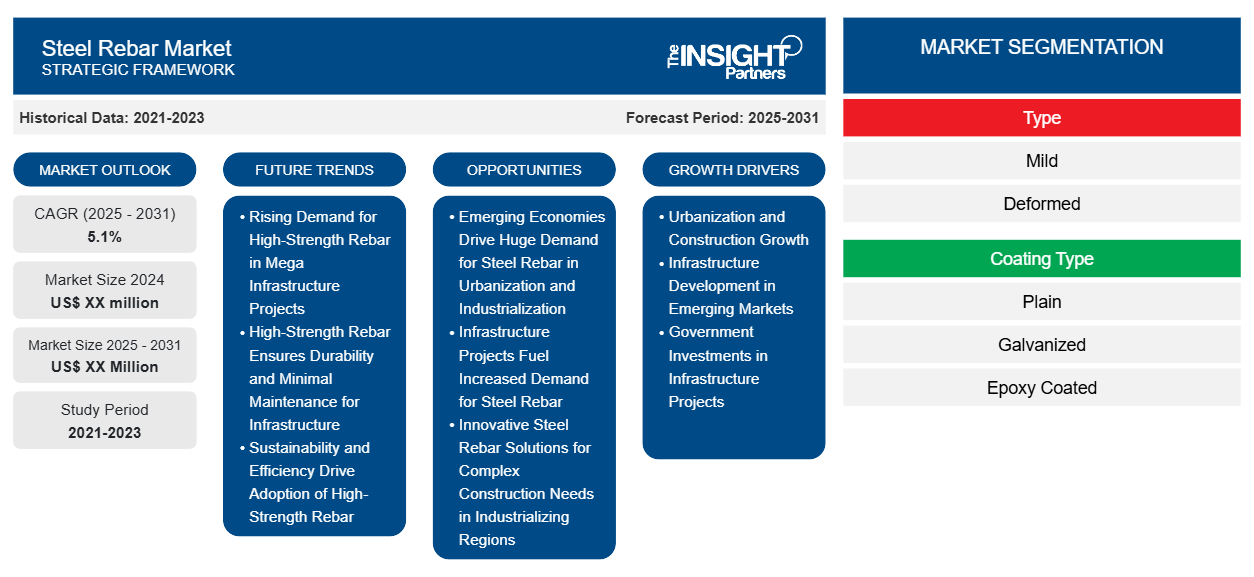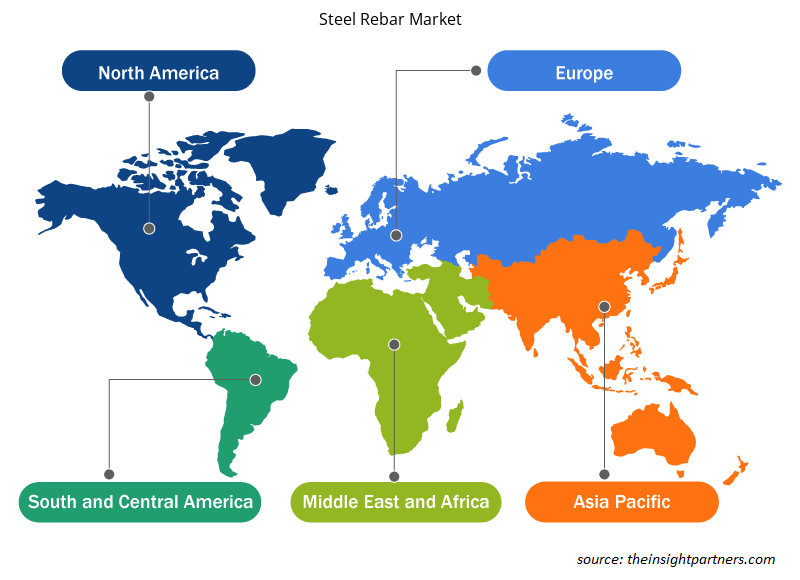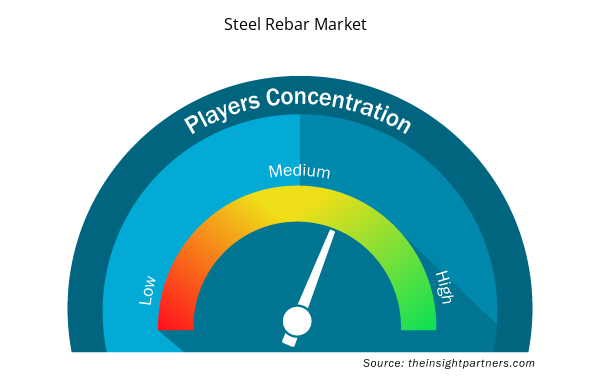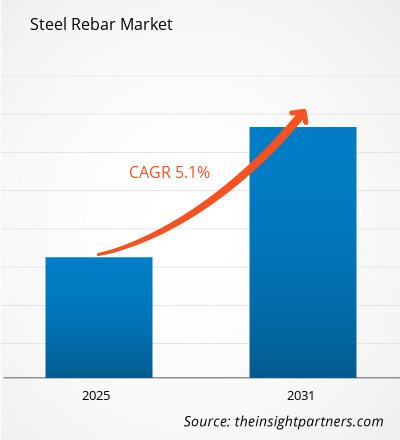The Steel Rebar Market is expected to register a CAGR of 5.1% from 2025 to 2031, with a market size expanding from US$ XX million in 2024 to US$ XX Million by 2031.
The report is segmented by By Type (Mild, Deformed, and Others). The report is also segmented based on Coating Type (Plain, Galvanized, Epoxy Coated) and Application (Residential Construction, Commercial Construction, Institutional, Infrastructural, and Industrial). The report scope covers 5 regions: North America, Europe, Asia Pacific, Middle East and Africa, and South and Central America and key countries under each region. The global analysis is further broken-down at regional level and major countries. The Report Offers the Value in USD for the above analysis and segments.
Purpose of the Report
The report Steel Rebar Market by The Insight Partners aims to describe the present landscape and future growth, top driving factors, challenges, and opportunities. This will provide insights to various business stakeholders, such as:
- Technology Providers/Manufacturers: To understand the evolving market dynamics and know the potential growth opportunities, enabling them to make informed strategic decisions.
- Investors: To conduct a comprehensive trend analysis regarding the market growth rate, market financial projections, and opportunities that exist across the value chain.
- Regulatory bodies: To regulate policies and police activities in the market with the aim of minimizing abuse, preserving investor trust and confidence, and upholding the integrity and stability of the market.
Steel Rebar Market Segmentation
Type
- Mild
- Deformed
Coating Type
- Plain
- Galvanized
- Epoxy Coated
Application
- Residential Construction
- Commercial Construction
- Institutional
- Infrastructural
- Industrial
Geography
- North America
- Europe
- Asia-Pacific
- South and Central America
- Middle East and Africa
Customize This Report To Suit Your Requirement
You will get customization on any report - free of charge - including parts of this report, or country-level analysis, Excel Data pack, as well as avail great offers and discounts for start-ups & universities
Steel Rebar Market: Strategic Insights

- Get Top Key Market Trends of this report.This FREE sample will include data analysis, ranging from market trends to estimates and forecasts.
Steel Rebar Market Growth Drivers
- Urbanization and Construction Growth: A basic factor that initiates a steel rebar market is rapid growth in construction activities and increased urbanization, mainly in developing economies. As more cities expand with new infrastructure developments initiated, the demand for steel rebar increases sharply. Rebar is crucial for reinforcing concrete structures, ensuring durability and strength.
- Infrastructure Development in Emerging Markets: In developing regions, infrastructure projects such as roads, bridges, and commercial buildings are rapidly expanding, hence thrust rebar consumption upwards. Urbanization increased residential constructions, which, in turn, led to higher steel rebar requirements. The demand for sound and durable structures continues to sustain the major function of rebar in the foundations for these projects.
- Government Investments in Infrastructure Projects: Apart from that, the public purse investment in large-scale infrastructure works on transportation networks tends to spur increased demand for steel rebar. The scenario is quite pronounced in regions modernizing and industrializing. This trend will continue with more projects progressing as the global demand for reinforced concrete in construction grows. Thus, the steel rebar market continues to thrive.
Steel Rebar Market Future Trends
- Rising Demand for High-Strength Rebar in Mega Infrastructure Projects: Emerging trends in the steel rebar market are based on the increasing demand for high-strength rebar. These types of rebars can withstand a greater load and have greater resiliency and corrosion resistance. Therefore, they are ideally suited for use in mega infrastructure projects, especially in regions susceptible to extreme conditions or seismic activity.
- High-Strength Rebar Ensures Durability and Minimal Maintenance for Infrastructure: The improvement of concrete structures with high-strength rebar guarantees durability while drastically minimizing maintenance. This trend is motivated mainly by the need for stronger infrastructure, which many developing countries are embarking on, investing billions in bridges, highways, and high-rises. Such countries require materials most suited under adverse environmental and mechanical environments.
- Sustainability and Efficiency Drive Adoption of High-Strength Rebar: In addition to that, the high-strength rebar also promotes sustainability because of less consumption of material in construction does not mean losing any structural quality. The construction industries worldwide are increasingly pushing to develop efficiency while lessening costs; hence they accelerate the shift toward using more high-strength rebars. This trend will continue in the future as more projects will demand durable yet performance-based materials for high-performance steel rebars.
Steel Rebar Market Opportunities
- Emerging Economies Drive Huge Demand for Steel Rebar in Urbanization and Industrialization: Steel rebar has a huge market opportunity from the spurting increase of infrastructure development across emerging economies. Countries like India, Brazil, and parts of Africa are transforming rapidly into urbanization followed by industrialization. This necessitates the construction of huge residential, commercial, and industrial buildings, which require enormous quantities of rebar.
- Infrastructure Projects Fuel Increased Demand for Steel Rebar: In addition, any major infrastructure development project such as roads, bridges, or power plants will further increase demand for steel rebar. As investment pours in by government agencies for the modernization of transportation and utility networks, the reliance on strong and durable materials like steel for these infrastructure projects will further augment the demand for rebar in the future.
- Innovative Steel Rebar Solutions for Complex Construction Needs in Industrializing Regions: As these regions continue to industrialize, there would be a paradigm shift to more complex construction, which would demand sophisticated rebar products. These trends create opportunities for innovation in the production of steel, such as production of higher-strength or corrosion-resistant rebar to cater for the increasing demands of emerging infrastructure and hence provide manufacturers with an avenue to increase their market share.
Steel Rebar Market Regional Insights
The regional trends and factors influencing the Steel Rebar Market throughout the forecast period have been thoroughly explained by the analysts at Insight Partners. This section also discusses Steel Rebar Market segments and geography across North America, Europe, Asia Pacific, Middle East and Africa, and South and Central America.

- Get the Regional Specific Data for Steel Rebar Market
Steel Rebar Market Report Scope
| Report Attribute | Details |
|---|---|
| Market size in 2024 | US$ XX million |
| Market Size by 2031 | US$ XX Million |
| Global CAGR (2025 - 2031) | 5.1% |
| Historical Data | 2021-2023 |
| Forecast period | 2025-2031 |
| Segments Covered |
By Type
|
| Regions and Countries Covered | North America
|
| Market leaders and key company profiles |
Steel Rebar Market Players Density: Understanding Its Impact on Business Dynamics
The Steel Rebar Market market is growing rapidly, driven by increasing end-user demand due to factors such as evolving consumer preferences, technological advancements, and greater awareness of the product's benefits. As demand rises, businesses are expanding their offerings, innovating to meet consumer needs, and capitalizing on emerging trends, which further fuels market growth.
Market players density refers to the distribution of firms or companies operating within a particular market or industry. It indicates how many competitors (market players) are present in a given market space relative to its size or total market value.
Major Companies operating in the Steel Rebar Market are:
- Gruppo Pittini S.p.A.
- ArcelorMittal SA
- JSW Steel Limited
- Tata Steel Limited
- Daido Steel Co., Ltd
- EVRAZ plc
Disclaimer: The companies listed above are not ranked in any particular order.

- Get the Steel Rebar Market top key players overview
Key Selling Points
- Comprehensive Coverage: The report comprehensively covers the analysis of products, services, types, and end users of the Steel Rebar Market, providing a holistic landscape.
- Expert Analysis: The report is compiled based on the in-depth understanding of industry experts and analysts.
- Up-to-date Information: The report assures business relevance due to its coverage of recent information and data trends.
- Customization Options: This report can be customized to cater to specific client requirements and suit the business strategies aptly.
The research report on the Steel Rebar Market can, therefore, help spearhead the trail of decoding and understanding the industry scenario and growth prospects. Although there can be a few valid concerns, the overall benefits of this report tend to outweigh the disadvantages.
- Historical Analysis (2 Years), Base Year, Forecast (7 Years) with CAGR
- PEST and SWOT Analysis
- Market Size Value / Volume - Global, Regional, Country
- Industry and Competitive Landscape
- Excel Dataset


- Dropshipping Market
- Excimer & Femtosecond Ophthalmic Lasers Market
- Greens Powder Market
- Airline Ancillary Services Market
- Medical Second Opinion Market
- Underwater Connector Market
- Intradermal Injection Market
- Personality Assessment Solution Market
- Aircraft Landing Gear Market
- Microplate Reader Market

Report Coverage
Revenue forecast, Company Analysis, Industry landscape, Growth factors, and Trends

Segment Covered
This text is related
to segments covered.

Regional Scope
North America, Europe, Asia Pacific, Middle East & Africa, South & Central America

Country Scope
This text is related
to country scope.
Frequently Asked Questions
Based on geography, Asia Pacific is expected to register the fastest CAGR from 2023 to 2031.
The report can be delivered in PDF/Word format, we can also share excel data sheet based on request.
Shift toward high-strength rebar is one of the key trends for the market growth.
JFE Steel Corporation, JSW Steel, Tata Steel, ArcelorMittal, Kobe Steel Ltd, Daido Steel Co Ltd, Nippon Steel Corporation, Nucor Corporation, Pacific Steel Group, and PJs Rebar are among the leading players operating in the steel rebar market.
Increased construction and urbanization is driving the market growth
The Steel Rebar Market is estimated to witness a CAGR of 5.1% from 2023 to 2031

 Get Free Sample For
Get Free Sample For